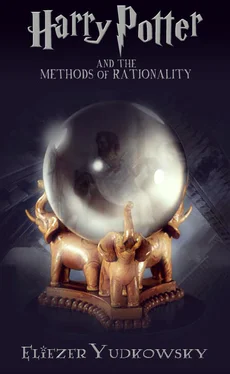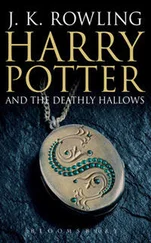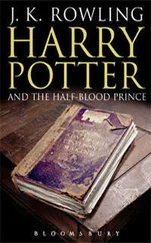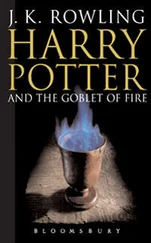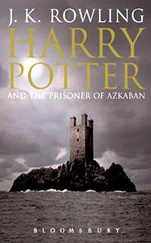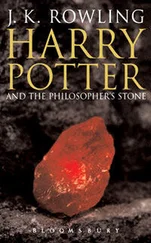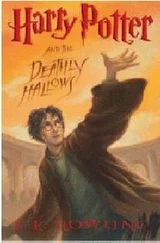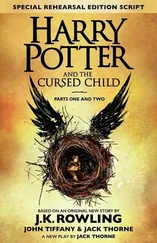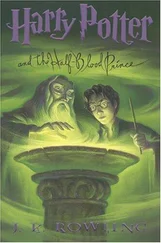Then Hermione flinched.
Harry looked away from her, and started taking slow, deep breaths.
"Please don't try to do it alone, Harry," Hermione said, her voice trembling. "Please."
Please don't make me have to decide whether to tell Professor Flitwick.
There was a long pause.
"So you want us to study," Harry said. She could tell he was trying to keep the anger out of his voice. "Just study."
Hermione wasn't sure if she should say anything, but... "Like you studied, um, timeless physics, right?"
Harry looked back at her.
"That thing you did," Hermione said, her voice tentative, "it wasn't because of our experiments, right? You could do it because you'd read lots of books."
Harry opened his mouth, and then he shut it again. There was a frustrated look on his face.
"All right," Harry said. "How about this. We study, and if I think of anything that seems really worth trying, we'll try it after I ask a professor."
"Okay," Hermione said. She didn't fall over with relief, but only because she was already sitting down.
"Shall we get lunch?" Harry said cautiously.
Hermione nodded. Yes. Lunch sounded good. For real, this time.
She carefully began to push herself off the stone floor, wincing as her body screamed at her -
Harry pointed his wand at her and said " Wingardium Leviosa. "
Hermione blinked as the huge weight on her legs diminished to something bearable.
A smile quirked across Harry's face. "You can lift something without being able to Hover it completely," he said. "Remember that experiment?"
Hermione smiled back helplessly, although she thought she ought to still be angry.
And she started walking back toward the Great Hall, feeling remarkably and wonderfully light on her feet, as Harry carefully kept his wand trained on her.
He only managed to keep it up for five minutes, but it was the thought that counted.
Minerva looked at Dumbledore.
Dumbledore gazed back inquiringly at her. "Did you understand any of that?" the Headmaster said, sounding bemused.
It had been the most complete and utter gibberish that Minerva could ever remember hearing. She was feeling a bit embarrassed about having summoned the Headmaster to hear it, but she'd been given explicit instructions.
"I'm afraid not," Professor McGonagall said primly.
"So," Dumbledore said. The silver beard swung away from her, the old wizard's twinkling gaze looked elsewhere once more. "You suspect you might be able to do something that other wizards can't do, something we think is impossible."
The three of them stood within the Headmaster's private Transfiguration workroom, where the shining phoenix of Dumbledore's Patronus had told her to bring Harry, moments after her own Patronus had reached him. Light shone down through the skylights and illuminated the great seven-pointed alchemical diagram drawn in the center of the circular room, showing it to be a little dusty, which saddened Minerva. Transfiguration research was one of Dumbledore's great enjoyments, and she'd known how pressed for time he'd been lately, but not that he was this pressed.
And now Harry Potter was going to waste even more of the Headmaster's time. But she certainly couldn't blame Harry for that. He'd done the proper thing in coming to her to say that he'd had an idea for doing something in Transfiguration that was currently believed to be impossible, and she herself had done exactly what she'd been told to do: she'd ordered Harry to be quiet and not discuss anything with her until she had consulted the Headmaster and they'd finished moving to a secure location.
If Harry had started out by saying what specifically he thought he could do, she wouldn't have bothered.
"Look, I know it's hard to explain," Harry said, sounding a little embarrassed. "What it adds up to is that what you believe conflicts with what scientists believe, in a case where I'd genuinely expect scientists to know more than wizards."
Minerva would have sighed out loud, if Dumbledore hadn't seemed to be taking the whole thing very seriously.
Harry's idea stemmed from simple ignorance, nothing more. If you changed half of a metal ball into glass, the whole ball had a different Form. To change the part was to change the whole, and that meant removing the whole Form and replacing it with a different one. What would it even mean to Transfigure only half of a metal ball? That the metal ball as a whole had the same Form as before, but half that ball now had a different Form?
"Mr. Potter," said Professor McGonagall, "what you want to do isn't just impossible, it's illogical. If you change half of something, you did change the whole."
"Indeed," said Dumbledore. "But Harry is the hero, so he may be able to do things that are logically impossible."
Minerva would have rolled her eyes, if she hadn't gone numb a long time ago.
"Supposing it was possible," said Dumbledore, "can you think of any reason why the results would differ in any way from ordinary Transfiguration?"
Minerva frowned. The fact that the concept was literally unimaginable was presenting her with some difficulty, but she tried to take it at face value. A Transfiguration imposed on only half of a metal ball...
"Strange things happening at the interface?" said Minerva. "But that should be no different than Transfiguring the object as a whole, into a Form with two different parts..."
Dumbledore nodded. "That is my own thought as well. And Harry, if your theory is correct, it implies that what you want to do is exactly like any other Transfiguration, only applied to a part of the subject rather than the whole? No changes at all? "
"Yes," Harry said firmly. "That's the whole point."
Dumbledore looked at her again. "Minerva, can you think of any reason whatsoever why that would be dangerous?"
"No," said Minerva, after she had finished searching through her memory.
"Likewise myself," said the Headmaster. "All right, then, since this ought to be exactly analogous to ordinary Transfiguration in all respects, and since we cannot think of any reason whatsoever why it would be dangerous, I think that the second degree of caution will suffice."
Minerva was surprised, but she didn't object. Dumbledore was by far her senior in Transfiguration, and he had tried literally thousands of new Transfigurations without ever choosing a degree of caution that was too low. He had used Transfiguration in combat and he was still alive. If the Headmaster thought the second degree was enough, it was enough.
That Harry was certainly going to fail was, of course, completely irrelevant.
The two of them started setting up the wards and detection webs. The most important web was the one that checked to make sure no Transfigured material had entered the air. Harry would be enclosed in a separate shell of force with its own air supply just to be certain, only his wand allowed to leave the shield, and the interface tight. They were inside Hogwarts so they couldn't automatically Apparate out any material that showed signs of spontaneous combustion, but they could launch it out a skylight almost as fast, the windows all folded outward for exactly that reason. Harry himself would go out a different skylight at the first sign of trouble.
Harry watched them working, his face looking a little frightened.
"Don't worry," said Professor McGonagall in the middle of her running description, "this almost certainly won't be necessary, Mr. Potter. If we expected anything to go wrong you would not be allowed to try. It's just ordinary precautions for any Transfiguration no one has ever tried before."
Читать дальше
